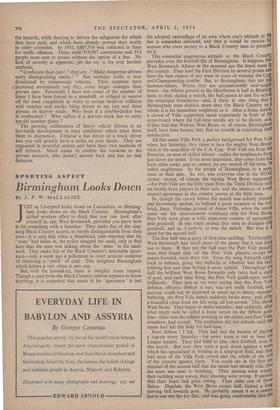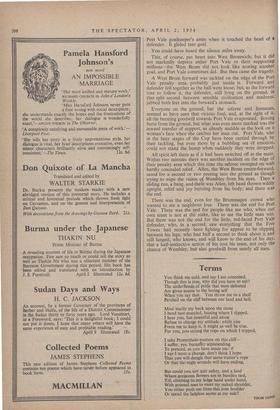SPORTING ASPECT
Birmingham Looks Down
By J. P. W. MALLALIEU JUST as Liverpool looks down on Lancashire, so Birming- ham looks down on the Black Country. Birminghath's skilled workers affect to think that you can look after yourself in, say, West Bromwich, provided you know how to hit something with a hamiter. They make fun of the sing- song Black Country accent, so barely distinguishable from their own—it is said that when a Smethwick man reported that his ' mate ' had fallen in, the police dragged the canal, only to find later that the man was talking about the ' mate ' in his sand- wich. They make fun of the Black Country's detectable ignor- ance—only a week ago a policeman in court accused someone of removing a ' cewit ' of coal. This delighted Birmingham which knows a cwt. when it sees one.
But, with the funmaking, there is mingled some respect. Though a man from the Black Country seldom appears to know anything, it is suspected that much of his ' ignorance ' is just the adopted camouflage of an area where one's attitude to thl law is somewhat informal, and that it would be unwise fo anyone who owes money to a Black Country man to presunl on it. This somewhat ungenerous attitude to the Black Counts pervades even the football life of Birmingham. It happens thSt West Bromwich Albion at the moment are the finest team the country. They lead the First Division by several points an have the best chance of any team in years of winning the cup and-Championship double. But, to Birmingham, they are ills/ hammer-hitters. Worse, they are uncomfortably near-neigh' bours—the Albion ground at the Hawthorns is half in Birmiegl ham, so that, during a match, the ball passes to and fro across the municipal boundaries—and, if there is one. thing that 4 Birmingham man dislikes more than the Black Country as 0 whole, it is his immediate neighbour in it. After a home match, a crowd of Villa supporters stand expectantly in front of the score-board where the full-time results are to be shown, and) if they find that Wolves, West Brom, or, of course, Birmingbaill itself, have been beaten, they find no trouble in concealing the!" satisfaction.
All this made Villa Park a perfect background for Port Vale when, last Saturday, they came to face the mighty West.Broer wich in the semi-final of the F.A. Cup. Port Vale are from the Potteries, an area of skilled labour—unlike the roughnecks froU just down the street. Even more important, they come from full forty miles away, and so cannot, by.any stretch of the term, b$ called neighbours. So the people of "Birmingham. to a mall, were on their side. So, too, was everyone else in the 69,00Q crowd—except, of course, the regular West Brom supported —for Port Vale are the little team from the Third Division wi3 six locally-born players in their side; and the instincts of eve .
neutral sportsman in the country yearns to the little man. , So, though the crowd before the match was soberly dresseq and decorously spoken, as befitted a great occasion in the red; brick, fusty, Victorian ground of Aston Villa, when the teal came out the decorousness continued only for West Broil, Port Vale were given a wild, expectant ovation of uncontaid4 able goodwill. In one tragic second they were to dissipate thi goodwill, and so, I believe, to lose the match. But that is story for the second half. The first half was a story of first-time tackling. Territorially West Bromwich had much more of the game; but it was litti use to them. If they got the ball near the Port Vale penall area, they found that all the Port Vale players, except th centre-forward, were there too. Even the wing forwards can?4 back in defence, going like bullocks at whoever had the bat robbing him and then belting it away upfield. Throughont the half the brilliant West Brom forwards only twice had a sigh! of goal, and each time King, the Port Vale goalkeeper, save brilliantly. Then just as we were saying that this Port Vale defence, effective though it was, was not really football, and anyway could not be expected to stand up to ninety minutes battering, the Port Vale attack suddenly broke away, and, aftet a beautiful cross from the left wing, all but scored. This shoolt West Brom. They began to make mistakes; and suddenly, aftet what might well be called a loose scrum on the Albion goal line—there was the referee pointing to the centre, and Port Vale, somehow, had scored, The exultation did not subside until the teams had left the field for half-time.
Poor Albion ! I felt. They had had the burden of playieS a cup-tie every Saturday—for every team is out to beat the League leaders. They had tried to play class football, even ie this match. But now they were a goal down against a teal!) which has specialised in holding to a snap-goal lead, and they had most of the Villa Park crowd and the whole of the rest of the country against them. You could see in the first tee minutes of the second half that the strain had already told, that the team was near to breaking. Their passing went wrong; their tackling went wrong, their shooting went wrong. It seemed that their heart had gone wrong. Then came one of those flukes. Dugdale, the West Brom centre half, kicked a long curving ball towards goal. He probably meant it as a centre, but it was too far for that, and was going comfortably into the Port Vale goalkeeper's arms when it touched the head of defender. It glided into goal.
You could have heard the silence miles away.
This, of course, put heart into West Bromwich; but it did not markedly depress either Port Vale or their supporting millions—for West Brom did not look like scoring another goal, and Port Vale sometimes did. But then came the tragedy.
A West Brom forward was tackled on the edge of the Port Vale penalty area, probably just inside it. Forward and defender fell together as the ball went loose; but, as the forward rose to follow it, the defender, still lying on the ground, in that split second between sensible civilisation and madness, jabbed both feet into the forward's stomach.
Everyone on the ground, bar the referee and linesman, seemed to have seen that vicious foul; and, at the sight of it, all the bursting goodwill towards Port Vale evaporated. Booing burst from the ground, but what was even more marked was the inward transfer of support, as silently audible as the look on a woman's face when she catches her man out. Port Vale, who in the later stages of the .Cup have been carried through by their tackling, but even more by a bubbling sea of emotion, could not stand the bump when suddenly they were dropped.
All spirit left them as if it had been switched off at the main. Within two minutes there was another incident on the edge of their penalty area which this time the referee swooped on with hardly concealed relief. Allen, the West Brom centre-forward. stood for a second or two peering into the ground as though trying to wipe the vision of Wembley from his eyes. Then a sliding run, a bang, and there was Allen, left hand thrown wildly upright, relief and joy bursting from his body; and there was the end.
There was the end, even for the Brummagen crowd who wanted to see a neighbour lose. There was the end for Port Vale. There was the end for people like me who, when our own team is not at the stake, like to see the little man win. But there was not the end for the little, red-faced Port Vale defender, who, in a second, saw everything that the Five Towns had recently been fighting for appear to be slipping between his legs; who had half a second to think about it and still lunged; who knows, and will know to the end of his day, that a half-instinctive action of his cost his team, not only the chance of Wembley, but also goodwill from nearly all men.



















































 Previous page
Previous page